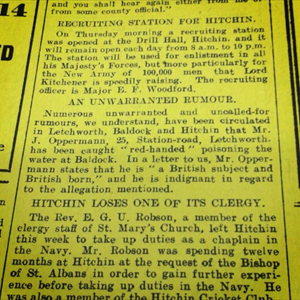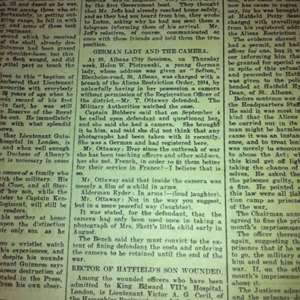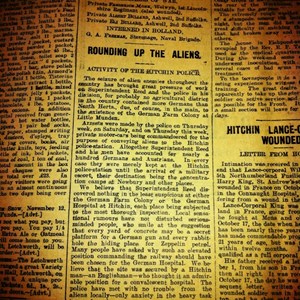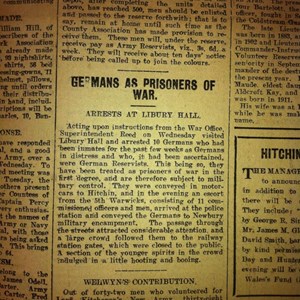Despite the turmoil caused by the conflict across the Channel life had to continue across the country. Hertfordshire was no different. In every town and village workers continued their employment in trades and industries vital to both the war effort and keeping the country intact. Schools, pubs and social clubs continued to open their doors in a bid to maintain a semblance of ordinary life.
The stories of these war years, collected from local newspaper articles, images and diaries, tell of a county which experienced the full range of emotions over four years - grief at the losses, desperation as pressures on food supplies grew, joy at the Armistice to name but a few. This section of the site aims to tell just a selection of these very personal and very real stories which are as poignant today as the stories of those on the front line.
Outbreak of War
Upon the outbreak of war, the general population of both the county and country experienced a wide range of emotions.
As a county of some 330,000 people in 1914 it is perhaps not surprising that such diverse emotions such as; National pride, panic, fear, suspicion, excitement and apprehension all featured in the daily life of Hertfordshire residents during the late months of 1914.
Espionage
Perhaps one of the lesser known issues prevalent in the early months of the Great War was the public suspicion aimed towards 'aliens' particularly those of German origin. The article here, taken from the Hertfordshire Express in late 1914 details the court appearance of Helen W Piotrowski, who was charged with being in possession of a Camera. As a German national she was not permitted such luxuries, especially ones that may be associated with espionage, and was fined in due course. While this particular article does at least have a lighter hearted approach, it is clear from other records that this was not always the case. The stigma attached to those with German sounding names was not one that was easily shaken off and contributed in large part to a huge amount of 'Anglicisation' of names that were commonplace in newspaper announcements such as the London Gazette throughout 1914 and 1915.
The eye of suspicion did not fall only on foreigners, but also on lifelong residents who happened to have a foreign sounding name or did not fit in with the general population. Malicious rumours related to espionage did not take long to spread and in a Chinese-whispers manner also gain embellishments along the way. Again, this could be incredibly distressing for those involved and also contributed, in 1914 at least, to a general feeling of unease and suspicion toward strangers in county communities.
The article here is the result of the targeting of one Mr Opperman who was a victim of the Great War rumour mill. As it happened, he was one of the very earliest and most well-known residents of his town, Letchworth Garden City. Mr Opperman clearly felt that these rumours were so harmful that he needed to address the issue directly with an appeal to the local paper.
Thankfully as the war progressed these occurrences became less frequent, largely due to the general population 'settling in' to a wartime existence, however, espionage was not the only issue that affected Hertfordshire's society shortly after the outbreak of war.
Enemy Aliens
Hertfordshire as a county was home to many foreigners before the outbreak of the Great War, including a healthy population of German ex-patriots. According to war-time governmental policy these German civilians were rounded up and detained in locations where they could remain and not constitute a threat to the country or native population. Hertfordshire was no exception in this manner. The article (below) describes how the local police Superintendent dealt with the tasks he was set.
The cultural and ethnic diversity that Hertfordshire enjoyed before the First World War was a source of pride to many in the county, and in most instances both the local authorities and the papers sought to dispel any myths or potential divides within those communities. Unfortunately, in the case of Libury Hall, a German Farm Colony, this was not always possible.
The following article (below right) relates to Libury Hall in the early months of The Great War.





